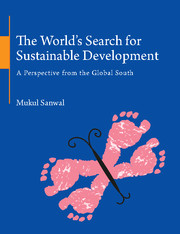Book contents
- Frontmatter
- Dedication
- Contents
- Preface
- Acknowledgments
- Abbreviations
- INTRODUCTION
- 1 Social Dimension of Sustainability
- CONSUMPTION IN AN UNEQUAL WORLD: FRAMING INTERNATIONAL COOPERATION
- 2 Geopolitics of the Global Environment
- 3 Natural Science – Policy – Institutions Interface
- 4 Focus on Developing Countries
- 5 Limitations of Multilateral Environmental Agreements
- CLIMATE POLICY: GLOBAL TO NATIONAL
- SUSTAINABLE DEVELOPMENT: NATIONAL TO GLOBAL
- CONSUMPTION IN A MORE EQUAL WORLD: SHAPING SOCIETAL FUNCTIONS
- GEOPOLITICS TO GEOECONOMICS: RURAL–URBAN DIVIDE, RATHER THAN BETWEEN COUNTRIES
- THE ASIAN CENTURY
- Index
2 - Geopolitics of the Global Environment
from CONSUMPTION IN AN UNEQUAL WORLD: FRAMING INTERNATIONAL COOPERATION
Published online by Cambridge University Press: 18 December 2015
- Frontmatter
- Dedication
- Contents
- Preface
- Acknowledgments
- Abbreviations
- INTRODUCTION
- 1 Social Dimension of Sustainability
- CONSUMPTION IN AN UNEQUAL WORLD: FRAMING INTERNATIONAL COOPERATION
- 2 Geopolitics of the Global Environment
- 3 Natural Science – Policy – Institutions Interface
- 4 Focus on Developing Countries
- 5 Limitations of Multilateral Environmental Agreements
- CLIMATE POLICY: GLOBAL TO NATIONAL
- SUSTAINABLE DEVELOPMENT: NATIONAL TO GLOBAL
- CONSUMPTION IN A MORE EQUAL WORLD: SHAPING SOCIETAL FUNCTIONS
- GEOPOLITICS TO GEOECONOMICS: RURAL–URBAN DIVIDE, RATHER THAN BETWEEN COUNTRIES
- THE ASIAN CENTURY
- Index
Summary
The global environmental concern has been shaped by an interrelated conceptual and normative framework. A two-track approach of mainstream sciences formed an extensive literature, which was provided to the public in a simplified form by the experts and to the science–policy interface informing multilateral treaties to establish processes of research, dialogue, negotiation and conflict resolution. Both streams have been entirely funded by the industrialized countries. The scientific research reflected their interests in shifting the focus away from the global impact of material requirements of infrastructure and the consumption of three-quarters of their own population which had moved to cities by the 1970s on to the larger agricultural, poor and growing population in developing countries arising from colonialism. With one-third of the global population, industrialized countries were already consuming three-quarters of the global natural resource, facilitated by an international system where the real price of these resources declined by a third between 1950 and 1970, and non-petroleum commodity prices again declined by a similar extent between 1990 and 2012. Fearing a similar trend of natural resource use in developing countries will raise prices and seeking to secure rights to natural resources outside national boundaries for continuing rapid growth, as their growth rates faltered from 1970 with urbanization, industrialized countries shaped the intellectual framework, agenda and rules on global environmental change, climate change and sustainable development within the United Nations.
Since the 1970s, the mainstream scientific understanding of the global environment and sustainable development has gone through three phases. The initial research focused on describing, measuring and monitoring what is happening to nature by collecting evidence of the adverse impacts of human activity, which at that time was evident in the developing countries, supplying commodities to the developed countries. This was followed with predictions of what could happen, as it was assumed that developing countries would follow the growth models of industrialized countries. Since the focus remained on the future and the newly industrializing countries, the explanation as to why these activities were leading to environmental degradation, particularly the expansion of agriculture into forest areas, was largely seen in terms of descriptions of the ‘tragedy of the commons’ and sociological theories, ignoring an earlier trend when the industrialized countries were at similar stages of development. We now know that the assertion that international regulation is needed to check ‘free riders’ was not evidence based.
- Type
- Chapter
- Information
- The World's Search for Sustainable DevelopmentA Perspective from the Global South, pp. 13 - 33Publisher: Cambridge University PressPrint publication year: 2015

